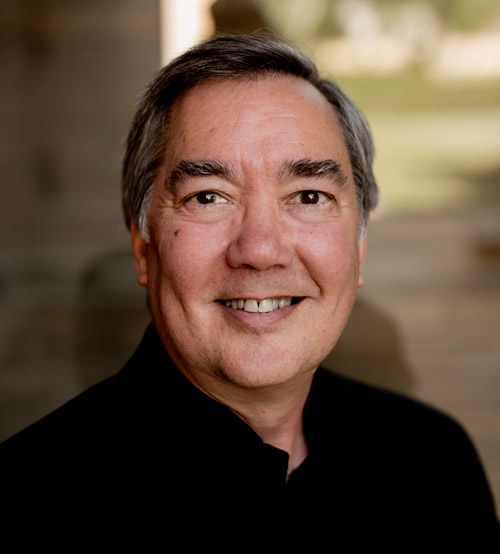Orpheus Chamber Singers blend eclectic music, nostalgic holiday warmth

Donald Krehbiel conducted the Orpheus Chamber Singers’ Christmas program Friday night in Dallas.
The high vaulted ceiling of St. Thomas Aquinas Catholic Church in Dallas provided a resonant and acoustically attractive setting for the Orpheus Chamber Singers and conductor Donald Krehbiel in their annual Christmas concert, “Wintersong,” Friday night.
This 24-voice choir, well worthy of its stand-out reputation among the area’s numerous choral organizations, sings with the low-vibrato, homogenously blended technique favored by small choral groups. This— combined with a nicely plotted repertoire and sensitive approach from conductor Krehbiel—resulted in a uniquely effective concert that rose above the traditional formula of concerts of this sort, while maintaining the requisite element of holiday warmth.
Bowing in the traditional direction, the concert featured two settings of the high-brow holiday favorite, “Er is ein Ros Entsprungen.” British composer James Whitbourn’s version, titled “A Great and Mighty Wonder,” relies on traditional chorale-like harmonies, while Swedish composer Jan Sandström’s brief version sets the original German text against a minimalist wordless choral backdrop.
Post-modern style likewise pervaded in Norwegian composer Ola Gjeilo’s “Serenity,” a slowly unwinding setting of the O magnum mysterium text, accompanied by cello (here performed by Fort Worth Symphony cellist Karen Hall) and featuring unexpected pauses between syllables.
The wordless third movement of American composer Robert Moran’s Seven Sounds Unseen showed off a pair of fine soloists in the soprano section and produced shimmering overtones in the expansive heights of this church. Soprano solo parts also floated gorgeously in Latvian composer Eriks Esenvalds’ frankly romantic setting of O salutaris Hostia (a text attributed, incidentally, to the patron saint of this particular church).
Danish composer Bo Holton’s “First Snow” sets a remarkable text by nineteenth-century Icelandic poet Stephan G. Stephanson, with wordless women’s voices providing the backdrop as the men’s voices present the text, showing off the clean precision of the tenor and bass sections. Lean unisons and gradually broadening harmonies likewise showed off the choir’s remarkable precision and clarity in “Song of the Pines” by Abbie Betinis. American composer Matthew Culloton’s subtle and sometimes counterintuitive arrangements of “The Holly and the Ivy,” “Angels We Have Heard on High,” and “In Dulci Jubilo” brought to the fore a wonderful sense of timing and control on the part of conductor Krehbiel.
A section devoted to music of colonial Latin America featured seventeenth-century Juan de Araujo’s Los Coflades de la Estleya, accompanied by cellist Hall and guitarist Nathaniel Earhart; in this remarkable cultural artifact, “Blasico, Perico, Juanico and Tomas . . . Poor boys, black boys from Safala” follow the Three Kings to the manger. In eighteenth-century Mexican composer Francisco Hernandez’s “Sancta Meria, e!,” a Nahuatl text marries a choral style reminiscent of Palestrina; seventeenth-century Mexican composer Juan Garcia de Zespedes’ “Convidando Esta la Noche” combines a similar choral richness with cello, guitar, and maracas. Guitar returned later in the program to join for American composer Jeffrey Van’s setting of the traditional Mexican lullaby carol “El Rorro,” in which “The elephant, and even the mosquito” guard the Christ child.
The stylistic breadth of this chamber choir was further represented by mainstream twentieth-century music, including John Joubert’s gently ecstatic, “Joy in the Morning,” William Walton’s gigue-like “All This Time,” and Richard Lloyd’s Rosetti setting “Love Came Down At Christmas,” with unapologetic lyricism and rich, close harmonies.
For the final item, the choir came down the side aisles for twentieth-century German composer Franz Biebl’s richly polychoral, Brahmsian “Ave Maria.” Inevitably at a Christmas choral concert, the audience was invited to sing along in “The First Nowell,” with a grand organ accompaniment. Intellect, sentiment, and just a touch of seasonally appropriate nostalgia combined neatly for a concert that managed to combine holiday spirit with engaging musical content.
The program will be repeated 7:30 p.m. Saturday at St. Thomas Aquinas Catholic Church in Dallas and 7:30 p.m. Tuesday at the Episcopal Church of the Transfiguration in Dallas. orpheuschambersingers.org; 214-530-0018